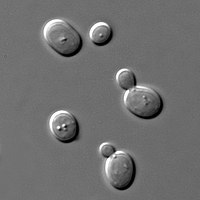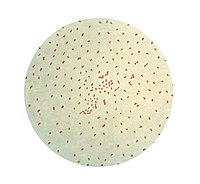
Multilocus Sequence Typing (MLST) and Whole Genome Sequencing (WGS) of Listeria monocytogenes and Listeria innocua.
Sign Up to like & getrecommendations! Published in 2021 at "Methods in molecular biology"
DOI: 10.1007/978-1-0716-0982-8_7
Abstract: Nucleotide sequence-based methods focusing on the single-nucleotide polymorphisms (SNPs) of Listeria monocytogenes and L. innocua housekeeping genes (multilocus sequence typing) and in the core genome (core genome MLST) facilitate the rapid and interlaboratory comparison in… read more here.
Keywords: listeria; genome; sequence; sequence typing ... See more keywords

Multi-locus Sequence Typing and Whole Genome Sequence Analysis of Cryptococcus neoformans Isolated from Clinical Specimens in Vajira Hospital, Bangkok, Thailand
Sign Up to like & getrecommendations! Published in 2020 at "Mycopathologia"
DOI: 10.1007/s11046-020-00456-7
Abstract: The basidiomycete yeast Cryptococcus neoformans causes disease in immunocompromized patients. Whole genome sequencing (WGS) technology provides insights into the molecular epidemiology of C. neoformans. However, the number of such studies is limited. Here we used… read more here.
Keywords: cryptococcus neoformans; whole genome; analysis; epidemiology ... See more keywords

Genetic analysis of clinical and vaccine strains of Bordetella pertussis by Pulsed-Field Gel Electrophoresis (PFGE), Multi Locus Sequence Typing (MLST) and serotyping.
Sign Up to like & getrecommendations! Published in 2019 at "Comparative immunology, microbiology and infectious diseases"
DOI: 10.1016/j.cimid.2019.03.010
Abstract: In spite of high vaccination coverage in the Expanded Program of Immunization (EPI), pertussis has not been eradicated yet and the re-emergence of the disease is still reported worldwide. The genetic divergence study of circulating… read more here.
Keywords: vaccine strains; sequence typing; pertussis; strains bordetella ... See more keywords

Culture-independent multilocus sequence typing of Pseudomonas aeruginosa for cross-infection screening.
Sign Up to like & getrecommendations! Published in 2021 at "Diagnostic microbiology and infectious disease"
DOI: 10.1016/j.diagmicrobio.2021.115315
Abstract: The genotyping of pathogens within cystic fibrosis cohorts is an important process, enabling the detection of transmissible and clinically-important strains. Traditionally this has been via culture-dependent processes. However, culture-independent investigation of respiratory samples is becoming… read more here.
Keywords: pseudomonas aeruginosa; culture independent; culture; sequence typing ... See more keywords

Genotyping Mycoplasma gallisepticum by multilocus sequence typing.
Sign Up to like & getrecommendations! Published in 2019 at "Veterinary microbiology"
DOI: 10.1016/j.vetmic.2019.03.016
Abstract: Mycoplasma gallisepticum causes chronic respiratory disease and reproductive disorders in many bird species, resulting in considerable economic losses to the poultry industry. Maintenance of M. gallisepticum-free flocks is the most adequate method to control infection.… read more here.
Keywords: mycoplasma gallisepticum; sequence typing; gallisepticum; multilocus sequence ... See more keywords

Overview of spatio-temporal distribution inferred by multi-locus sequence typing of Taylorella equigenitalis isolated worldwide from 1977 to 2018 in equidae.
Sign Up to like & getrecommendations! Published in 2020 at "Veterinary microbiology"
DOI: 10.1016/j.vetmic.2020.108597
Abstract: The accurate identification of Taylorella equigenitalis strains is essential to improve worldwide prevention and control strategies for contagious equine metritis (CEM). This study compared 367 worldwide equine strains using multilocus sequence typing according to the… read more here.
Keywords: 1977 2018; taylorella equigenitalis; isolated worldwide; sequence ... See more keywords

A critical re-evaluation of multilocus sequence typing (MLST) efforts in Wolbachia
Sign Up to like & getrecommendations! Published in 2018 at "FEMS Microbiology Ecology"
DOI: 10.1093/femsec/fix163
Abstract: Wolbachia (Alphaproteobacteria, Rickettsiales) is the most common, and arguably one of the most important inherited symbionts. Molecular differentiation of Wolbachia strains is routinely performed with a set of five multilocus sequence typing (MLST) markers. However,… read more here.
Keywords: typing mlst; wolbachia; critical evaluation; sequence typing ... See more keywords

Diversity of Cronobacter genus isolated between 1970-2019 on the American continent and genotyped using multi-locus sequence typing.
Sign Up to like & getrecommendations! Published in 2021 at "FEMS microbiology letters"
DOI: 10.1093/femsle/fnab027
Abstract: This study aimed to evaluate the Cronobacter spp. strains isolated on the American continent and characterized using multi-locus sequence typing (MLST) available in the PubMLST database and current literature. From 465 Cronobacter spp. strains, the… read more here.
Keywords: using multi; american continent; multi locus; locus ... See more keywords

Multilocus sequence typing (MLST) analysis reveals many novel genotypes and a high level of genetic diversity in Candida tropicalis isolates from Italy and Africa
Sign Up to like & getrecommendations! Published in 2022 at "Mycoses"
DOI: 10.1111/myc.13483
Abstract: Candida tropicalis is a human pathogenic yeast frequently isolated in Latin America and Asian‐Pacific regions, although recent studies showed that it is also becoming increasingly widespread throughout several African and south‐European countries. Nevertheless, relatively little… read more here.
Keywords: candida tropicalis; typing mlst; sequence typing; multilocus sequence ... See more keywords

Problems with the Oxford Multilocus Sequence Typing Scheme for Acinetobacter baumannii: Do Sequence Type 92 (ST92) and ST109 Exist?
Sign Up to like & getrecommendations! Published in 2017 at "Journal of Clinical Microbiology"
DOI: 10.1128/jcm.00533-17
Abstract: Even in the genomic era, multilocus sequence typing (MLST) remains a method of choice for bacterial typing, quickly revealing relationships within and between bacterial lineages. There are two Acinetobacter MLST schemes, one devised by Bartual… read more here.
Keywords: problems oxford; oxford multilocus; sequence; sequence typing ... See more keywords

Subtyping Salmonella isolated from pet dogs with multilocus sequence typing (MLST) and clustered regularly interspaced short palindromic repeats (CRISPRs)
Sign Up to like & getrecommendations! Published in 2021 at "AMB Express"
DOI: 10.1186/s13568-021-01221-9
Abstract: Salmonella , as a zoonotic pathogen, has attracted widespread attention worldwide, especially in the transmission between household pets and humans. Therefore, we investigated the epidemic distribution of dog Salmonella from pet hospitals and breeding base… read more here.
Keywords: salmonella; mlst clustered; typing mlst; sequence ... See more keywords